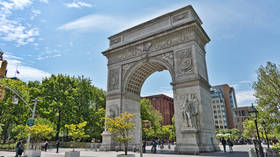Two Georgetown academics have been CANCELLED because of a Zoom call. One talked about black students’ grades. The other nodded
A law professor was fired after she was seen remarking on the low average performance of black students. The professor with whom she’d been talking then ‘resigned’ – apparently for the crime of not disagreeing with her.
It’s been a tumultuous week for Georgetown University Law Center: the school is now short two faculty members, following the latest incident of academic cancel culture. On 10 March, a student posted a video on Twitter showing a conversation between two professors: Sandra Sellers and David Batson.
In the short clip, Sellers says to Batson: “You know what? I hate to say this. I end up having this angst every semester that a lot of my lower ones are blacks. Happens almost every semester. And it’s like, oh come on. It’s some really good ones, but there are also usually some that are just plain at the bottom. It drives me crazy.” Meanwhile, Batson appears to nod in agreement.
The student’s tweet went viral, gathering over 10,000 likes in three days. It describes the footage as “Beyond unacceptable.” A day later, on 11 March, the student posted a follow-up tweet that links to an open letter from the Black Law Students Association. The letter, addressed to the law school administration, condemns Sellers’ remarks as “blatant and shameless racism”, taking them as evidence that her “bias has impacted the grades of Black students in her classes historically.”
The letter proceeds to demand “nothing short of the immediate termination of Professor Sandra Sellers”. As to Batson, it demands a public apology for “his failure to adequately condemn Sellers’ statements”. It also calls for the hiring of more black faculty, who in the words of the petitioners “will be better situated to fairly assess Black students in a non-biased manner.” The letter is signed by hundreds of students and alumni, as well as groups such as ‘If/When/How Lawyering for Reproductive Justice’ and ‘Georgetown Law Women of Color Collective’.
Naturally, the law school’s administration caved. (Sellers, incidentally, had been teaching there for almost 20 years.) In a statement on 10 March, Dean William Treanor described the footage as “abhorrent”, and assured students that he had asked the university’s Office of Institutional Diversity, Equity & Affirmative Action to undertake a “thorough” investigation.
A day later, on 11 March, Treanor announced that Sellers’ relationship with the law school had been terminated, and that Batson had been placed on administrative leave, pending the outcome of the investigation. He added, “This is by no means the end of our work to address the many structural issues of racism reflected in this painful incident”, whilst highlighting “the need for more comprehensive anti-bias training”. The next day, Batson resigned.
If you’re wondering how the video got out in the first place, what appears to have happened is that Sellers and Batson were talking to one another at the end of class, after all the students had logged off. However, the video system continued recording, and the full video was uploaded to a class website.
Interestingly, both cancelled academics were resolutely contrite about the incident; neither gave any indication that they felt the students had overreacted, or that they should have been able to keep their jobs. Sellers told Treanor that she was planning to resign anyway, and admitted in her resignation letter that she had done “irreparable harm” for which she was “truly sorry”.
Batson, too, apologised in his own resignation letter. “I understand”, he wrote, “that I missed the chance to respond in a more direct manner to address the inappropriate content of those remarks.” In other words, Batson accepted that losing his job was a reasonable punishment for the crime of not disagreeing with a colleague about something she said in a private conversation. Note that Batson’s fate represents a kind of second-order cancel culture. Not expressing controversial views is no longer enough; if you don’t actively denounce people who do express such views, you’re at risk of being cancelled.
Also on rt.com British universities’ mass-produced ‘anti-racism’ statements show they care more about activism than educationHowever, were Sellers’ remarks really so awful? Could they not have been dealt with via a brief statement of clarification (that she is not biased), and perhaps an apology for the unprofessionalism of leaving the video system on while having a private conversation. None of what she said is actually disparaging toward black students. Sellers merely noticed that such students tend to score at the bottom of the class. She even expressed consternation about this, noting, “It drives me crazy.”
Tellingly, Sellers is not the first academic to land in hot water for discussing the low average performance of black law students. A few years ago, Professor Amy Wax of the University of Pennsylvania Law School became the subject of mass denunciations, and was eventually removed from teaching required courses, after saying that she had “rarely” seen a black student graduate in the top half of the class. On that occasion, one assumes the only thing that prevented the denounced from being fired was the fact that she had tenure.
Notwithstanding administrators’ protestations to the contrary, circumstantial evidence suggests that Sellers and Wax were approximately accurate in their observations about black law students. A 2016 study, which looked at data from the University of Michigan in 2002, found that the average black student admitted to the law school had a lower academic index than 98% of white students. And an earlier study, which analysed 1992 data from several elite law schools, found that 52% of black students scored in the bottom 10% of their first-year class.
One would have assumed that principles like factual accuracy, not to mention proportionality, would matter at a top-ranked law school. But apparently not. In the current year, what matters is making sure that students don’t feel offended, and if that means two academics have to lose their jobs for having a private conversation, then so be it. Law is meant to be a hard-nosed discipline where you focus on the facts at hand. If students can’t handle an ill-advised remark about student grading, they’re going to find the cut and thrust of the courtroom quite a struggle indeed.
Think your friends would be interested? Share this story!
The statements, views and opinions expressed in this column are solely those of the author and do not necessarily represent those of RT.















